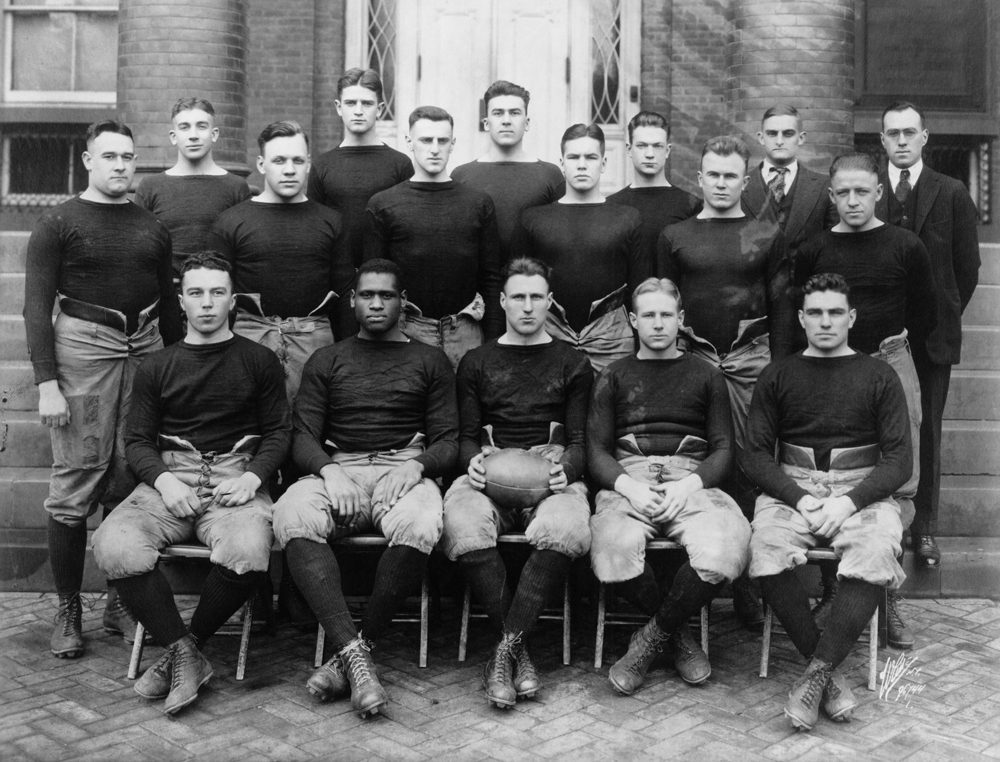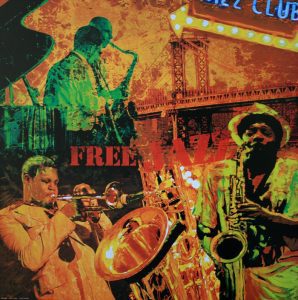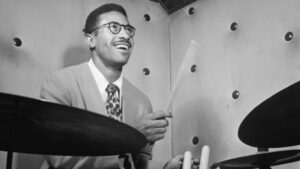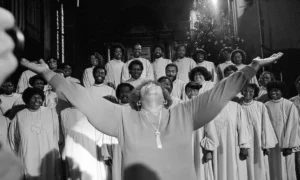"The Renaissance Man" The Incredible Life of Paul Robeson By: Kalia Simms
Abstract
Paul Robeson was nothing short of incredible. He exemplified greatness in everything he did and is an example of the vast talent, passion, and resilience Blacks have. Not only was Robeson a renowned athlete, but he was a singer, and actor, and most importantly, an activist. The incredible and risk filled life of Paul Robeson is one that we should all know about. While Robeson should be remember for his glaring talents, he should also be remembered for his ability to fight forces much larger than him, and move nations across the world with his words.
Methodology
I have gathered my information about Paul Robeson from a number of sources including websites and scholarly articles but my key source has been Paul Robeson’s book Here I Stand. I wanted to hear his story through his own words and I knew that he would include details I could not get elsewhere. Through this text I was able to get a full sense of who Paul Robeson was as an artists and as a person.
Thesis
The best type of artistry is paradoxical. It is immensely painful and gratifying . Daunting at times, yet rewarding. This was the life of Paul Robeson. Living an incredible life through art and other forms of expression was paradoxical for Robeson . It was through his struggle that he was able to reap the rewards of his impeccable accomplishments.
Early Days
Paul Robeson was the youngest of 5 children born to reverend William Drew Robeson and Maria Louisa Bustill. Robeson was born in Princeton New Jersey in 1898. A place where, he states in an interview, many of the college students were traveling to from the deep south to pursue their degrees. Robeson’s father, who was a former slave, went on to become a minister at Princeton’s Witherspoon Presbyterian Church and his mother was the daughter of a prominent racially mixed family of the area. Robeson’s life changed when his mother died in a house fire when he was just six years old. Without the presence of his mother Robeson’s father felt immense pressure to do the best he could raising him. Robeson makes clear in his book that it was his father that taught him diligence, passion, and an unequivocal amount of compassion for the world despite their circumstances

"The Renaissance Man"
Paul Robeson was so exceptional at everything he attempted that he was known as the 20th century Renaissance man. A remarkable athlete, scholar, actor, and singer, Robeson was a wonder for the world. After performing in four different sports in his lifetime and being able to perform in 25 different languages, Robeson left his mark everywhere he went. After leaving Rutgers Valedictorian of his class he went on to get his law degree where he was only met with racist hostility and disdain for his presence. Even still, Robeson persisted. Making noise about social justice in all parts of the world. He can even be seen singing to a group working class citizens in Europe about sharing the woes of poverty. Robeson traveled the world and received many accolades for his accomplishments. Interestingly enough, Robeson was viewed as a gift and a curse; especially by White American. Was the Renaissance man a threat to society?
A Man of Many Talents
To say Paul Robeson was a man of many talents is an understatement. At seventeen Robeson received a scholarship to go to Rutgers University where he was only the fourth Black student to attend. After excelling at the university, earning 15 letters in 4 different varsity sports and becoming valedictorian, Robeson went on to attend law school at Columbia University. While in law school Robeson taught latin and played professional football on the weekends to pay his way through school. He then began to work at a law firm in New York where he focused his attention on racial discrimination and injustice. After experiencing racism at the firm his wife Eslanda Goode encouraged him to make the decision to dedicate himself to the stage. Robeson went on to star in Shakespeare’s Othello, the musical Showboat, and films such as Jericho and Proud Valley.
Robeson Disrupts "White American Theater"
Robeson was the first Black man to perform prominent roles in White American theater. On October 19, 1943 Robeson became the first Black main to play a leading role of Othello. Robeson also had an all white supporting cast and was receiving higher pay than many of his white counterparts. Prior to Robeson playing Othello, the last Black person to attempt the role was Ira Aldrige. The production was shut down and a critic wrote : “Owing to the shape of his lips it is utterly impossible for hime to pronounce english”. It is no surprise that it took almost a century for another Black actor to assume the role. Many were uncomfortable with the fact that A Black man was playing the role of Othello. Critics would talk negatively about his physical appearance and question his talent despite positive reaction from audience members. Robeson who played Othello, a jelous character was (according to critics) perfect for the role because “by reason of his race Mr. Robeson is able to surmount the difficulties which English actors generally find in the part” Whites in the media attributed Robeson’s success to everything but his undeniable talent and his passion for the stage.
Fame and Social Justice; What Matters More
The most interesting aspect of “the Renaissance man” was his life of activism. Robeson passion for a fair, just, and equal world led him to be know in all parts of the world. Throughout his career Robeson became increasingly involved in the fight for issues of labor rights, anti-colonialism, and human rights, specifically in such political debates as Welsh unionization, British de-colonization, the Spanish Civil War, and ultimately the griping violation of human rights occurring against African Americans in the United States. Robeson possessed many socialists and anti-colonialists belief. These belief were largely due to his support of the Soviet Union. Many of his beliefs came straight out of the Soviet Constitution. When Robeson moved to England with his family his artistry served even more a moral cause. Robeson states in his book ‘Here I Stand’ that he “learned that the essential character of a nation is determined not by the upper classed, but by the common people, and that the common people of all nations are truly brother in the great family of mankind”. At the start od the Cold War when tension between the U.S. and Russia was at its highest and the crimes of Joseph Stalin were revealed Robeson refused to denounce communism. Robeson even encouraged young Black men not to agree to fight for the U.S. if a war against the Soviet Union were to break out. Robeson’s popularity plummeted and in 1950 his passport was illegally seized by the U.S. government to keep him from performing and speaking abroad. This led Robeson to be blacklisted and shunned by the theater world. Robeson then became depressed as lost contact with his friends and family and retracted from society completely. In 1958 Robeson’s passport was restored. His autobiography was released later that year. This was not the first time a Black figure was singled out for fighting for democracy all over the world but this loss was a grave one. Robeson’s legacy lived on through art and activism but his story is hardly ever told.
Robeson's Lasting Impact
Paul Robeson exemplified resilience. While alive Robeson was hardly recognized for his contributions to this world and the perception of him was clouded by propaganda and false constructions of reality. In reality, Robeson was simply a remarkably impressive man with enough compassion and passion to change the world. In the stories of activism, his remains unknown but his artistry lives on because the one thing no one could take away from him was his talent.
Why Artists Should be Activists; Closing Remarks
Robeson’s amazing life should inspire artists to also be activists. I believe it is important to use your talent to give voice to the voiceless. That is exactly what Paul Robeson did. Though he payed a price, the sacrifices he made for social justice were ones that speak to his character. There is never a time where artists do not need to be concerned with activism. Music is a universal language that can be used as a tool to spread positive messaged to all groups of people around the world. It is my hope that we as a culture don’t lose sight of the strength of our creations.
Discography
| Title/Composer | |
|---|---|
Bibliography

The History Of Jazz
In this course I learned the Roots of the music genre Jazz. This consisted of learning the different styles that emerged from Jazz such as:

Free Jazz – Albert Tyler’s “Spiritual Unity”
Spiritual Unity Breakdown Track 1 & 4- Ghosts Track 2 – The Wizard Track 3 – Spirits Track 5 – Vibrations Overall Listening to this

Max Roach – Bebop Musician
Maxwell or Max Roach was born on January 10, 1924 in NewLand North Carolina. Seeking better opportunities his parents moved Roach and his family to

Whack World: Genius of Tierra Whack- Imani Blue
/*! elementor – v3.18.0 – 08-12-2023 */ .elementor-heading-title{padding:0;margin:0;line-height:1}.elementor-widget-heading .elementor-heading-title[class*=elementor-size-]>a{color:inherit;font-size:inherit;line-height:inherit}.elementor-widget-heading .elementor-heading-title.elementor-size-small{font-size:15px}.elementor-widget-heading .elementor-heading-title.elementor-size-medium{font-size:19px}.elementor-widget-heading .elementor-heading-title.elementor-size-large{font-size:29px}.elementor-widget-heading .elementor-heading-title.elementor-size-xl{font-size:39px}.elementor-widget-heading .elementor-heading-title.elementor-size-xxl{font-size:59px} Who is Tierra Whack? Tierra Whack, a Grammy nominee, Double-XXL freshman,

Jazz as a Catalyst for Social Change: A Harmonious Connection – Imani Blue
/*! elementor – v3.18.0 – 08-12-2023 */ .elementor-heading-title{padding:0;margin:0;line-height:1}.elementor-widget-heading .elementor-heading-title[class*=elementor-size-]>a{color:inherit;font-size:inherit;line-height:inherit}.elementor-widget-heading .elementor-heading-title.elementor-size-small{font-size:15px}.elementor-widget-heading .elementor-heading-title.elementor-size-medium{font-size:19px}.elementor-widget-heading .elementor-heading-title.elementor-size-large{font-size:29px}.elementor-widget-heading .elementor-heading-title.elementor-size-xl{font-size:39px}.elementor-widget-heading .elementor-heading-title.elementor-size-xxl{font-size:59px} Origins of Jazz Picture this: The dawn of the 20th century,

Evolution of Black Gospel Music: A Comparative Analysis with Contemporary Gospel -Imani Blue
Black gospel music is deeply intertwined with the African-American experience, having evolved into a compelling and influential genre within the broader spectrum of gospel music.

